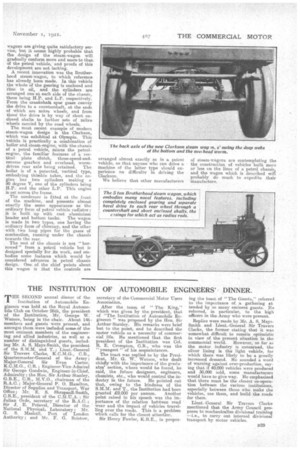THE INSTITUTION OF AUTOMOBILE ENGINEERS' DINNER.
Page 19

If you've noticed an error in this article please click here to report it so we can fix it.
THE SECOND annual dinner of the Institution of Automobile Engineers was held at the Royal Automobile Club on October 26th, the president of the Institution, Mr. George W. Watson, being in the chair. About 146. members and guests were present, and amongst them.were included some-of the most eminent members of the engineering and allied industries, as well as a number of distinguished guests, including Mr. A. S. Mays-Smith, the president of the S.M.M. and T. ; Lieut.-General Sir Travers Clarke, K.C.M.G., C.13., Quartermaster General of the Army ; Major-General Sir Evan Carter, K.C.M.G., C.B. ; Engineer-Vice-Admiral Sir George Goodwin, Engineer-in-Chief, Admiralty ; the Hon. Sir Arthur Stanley, G.B.E., CB., M.V.O., chairman of the
; Major-General P. 0. Hazelton, Director of Supplies and Transport, War Office; Mr. E. S. Shrapnell-Smith, C.B.E., president of the C.M.U.A. ; Sir Julian Orde, secretary of the R.A.C. ; SirJ. E. Betavel, Director of the National Physical, Laboratory ; Mr. G. S. Masked], Port of London Authority ; and Mr. F. G. Bristow, secretary of the Commercial Motor Users Association.
After the toast Of " The King," which was given by the president, that of "The Institution of Automobile Engineers " was proposed by the Hon. Sir Arthur Stanley. His remarks were brief but to the point, and he described the motor vehicle as a necessity of commercial life. He mentioned that the first president of the Institution was Col. R. E. Crompton, C.B., who was the " youngest" of his acquaintances.
The toast was replied to by the President, Mr. G. W. Watson, who dealt chiefly with the importance of the graduates' section, where would be found, he said, the future designers, engineers, chemists, etc., who would control the industry in the future. He pointed out that, owing to the kindness of the S.M.M. and T., the Institution had been granted £2,000 per annum. Another point raised in his speech was the importance of the relation betWeen road • wear and the impact of vehicles travelling over the roads. This is a problem which calls for the closest attentior.
Sir Henry Fowler, K.B.E., in propos
ing the toast of "The Guests," referred to the. importance of a gathering at tended by so many eminent guests. He referred, in particular, to the high officers in the. Army who were present.
Replies were made by Mr. A. S. MaysSmith and Lieut.-General Sir Travers Clarke, the former stating that it was somewhat difficult to remain optimist-le in view of the present situation in the commercial world. However, so far as the motor industry is concerned, the silver lining is the light vehicle, for which there was likely to be a greatly increased demand. He sounded a word of warning against over-production, saying that if 40,000 vehicles were produced and 30,000 sold, some manufacturers would have to give way. He emphasized that there must be the closest co-operation between the various institutions, especially between those who make the vehicles, use them, and build the roads for them.
Lieut.-General Sir Travers Clarke mentioned that the Army Council proposes to mechanicalize divisional training —i.e., to carry out internal divisional transport by motor vehicles.
































